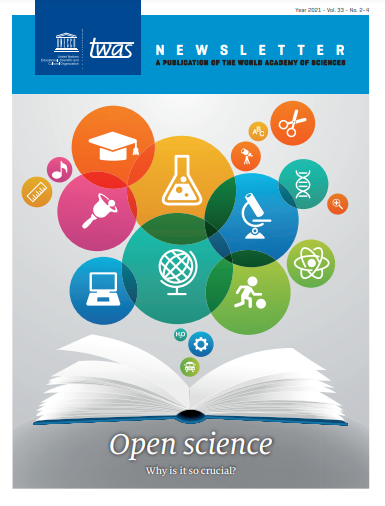![The forty-first session of UNESCO General Conference, held in Paris, from 9 to 24 November 2021, during which UNESCO Recommendation on Open Science was adopted. [Photo: UNESCO]](/sites/default/files/inline-images/unesco_assembly_3_web.jpg) To face the challenges of today’s world—from climate change to pandemics—science relies heavily on cooperation across borders, as well as willingness to collaborate and share scientific results openly. And now, the world’s nations and scientific institutions have the opportunity to unite behind a new framework for conducting science openly and transparently.
To face the challenges of today’s world—from climate change to pandemics—science relies heavily on cooperation across borders, as well as willingness to collaborate and share scientific results openly. And now, the world’s nations and scientific institutions have the opportunity to unite behind a new framework for conducting science openly and transparently.
Since about the turn of the twenty-first century, as Internet usage became increasingly common, academics, policymakers and the greater public have been engaged in a debate over how the rapidly increasing availability and fluidity of information should influence scientific practices. In time, advocacy for “open science” began to build into what is today a movement to make science, its methods, its data and its results more accessible and transparent to everyone, inside and outside of academia.
Making science more open could have an enormous impact on both the research community and the developing world. Efforts to push this change culminated in an official framework set by the United Nations Educational, Scientific and Cultural Organization (UNESCO): the Recommendation on Open Science. Adopted by the UNESCO General Conference on 23 November 2021, the Recommendation identifies what open science means, and lays out standards for how it works in practice. It also proposes ways citizens can take part in the global effort to generate and share scientific knowledge.
 At the heart of the Recommendation is its definition of open science: “an inclusive construct that combines various movements and practices aiming to make multilingual scientific knowledge openly available, accessible and reusable for everyone, to increase scientific collaborations and sharing of information for the benefits of science and society, and to open the processes of scientific knowledge creation, evaluation and communication to societal actors beyond the traditional scientific community.”
At the heart of the Recommendation is its definition of open science: “an inclusive construct that combines various movements and practices aiming to make multilingual scientific knowledge openly available, accessible and reusable for everyone, to increase scientific collaborations and sharing of information for the benefits of science and society, and to open the processes of scientific knowledge creation, evaluation and communication to societal actors beyond the traditional scientific community.”
And in the course of defining open science, the Recommendation has numerous goals. Mostly, it aims to provide an international framework for policy and a practice that takes into account all the factors that might complicate it. These include academic freedom and specific challenges scientists might face in different countries, especially considering that some developing countries and emerging economies have greater access to resources than other scientifically or technologically lagging nations. The Recommendation also lays out key objectives and areas of action, including bolstering a common understanding of open science, a policy environment for it, and investments in infrastructure and services for it.
So why is open science important, and how can it help not only scientists, but policymakers and laypersons alike? And how will accessible and transparent science influence efforts to build or conduct scientific research in developing countries, especially least developed countries?
These questions are at the forefront of a feature article in the latest TWAS Newsletter, which is all dedicated to open science, with TWAS usual focus on developing countries' perspective. So, please, read on.
Sean Treacy

